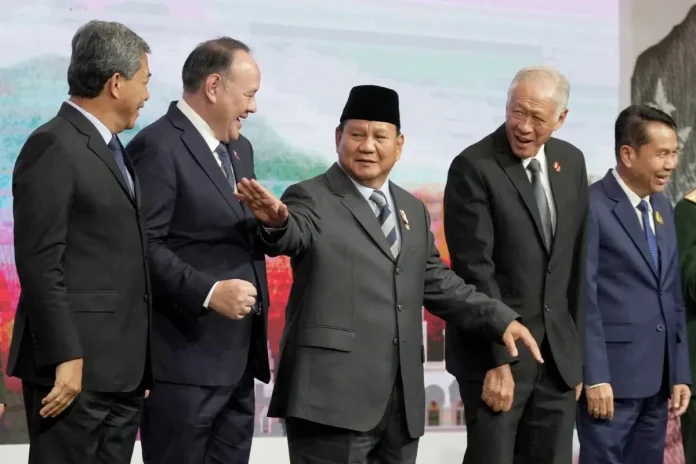More assertive foreign policy and democratic backsliding are most likely on the horizon.
Indonesian President-elect Prabowo Subianto has been a fixture in his country’s politics for decades. He ran for president several times before his recent victory, served as defense minister and was a major force in parliament. And yet, he won the election largely because of outgoing President Joko Widodo’s endorsement.
That has led some experts to believe that as president, Prabowo, who is 72, would essentially be a puppet of Widodo, popularly known as Jokowi. The incumbent supported the incoming leader in part because the latter made Jokowi’s inexperienced son his vice president.
The whole notion is hard to believe, despite Widodo’s sizable popularity: Prabowo will be his own man. He will chart his path on foreign policy, some aspects of domestic affairs and possibly on issues related to democracy, whose institutions have weakened in Indonesia — one of Asia’s democratic success stories since the end of the Suharto regime.
It is likely that fairly early in his term, Prabowo will make clear that he is not indebted to Jokowi and that there will be a rift between their two camps — which Prabowo, as the incumbent and with a lot of sway in parliament, will probably win.
While Jokowi showed little interest in foreign affairs during his two presidential terms, Prabowo is the opposite. He has displayed intense engagement — often speaking about external relations — in making Indonesia a much bigger geopolitical player in Asia, reclaiming regional leadership from countries like Singapore and Vietnam and putting Indonesia in the realm of the world’s key middle powers.
This would include Jakarta having much more of a say in international institutions and playing a larger role in regional security. It would also entail the country once more becoming first among equals in the Association of Southeast Asian Nations and possibly making ASEAN a more active organization, rather than the passive grouping it has become — unwilling, for example, to do anything serious about the crisis in Myanmar, one of its member states.
Could Prabowo achieve these aims? It is possible, but doubtful.
Other Southeast Asian governments have gotten used to playing larger roles in ASEAN and would recoil at the thought of things going back to the way they were under Suharto, when Indonesia dominated the institution. ASEAN is not going to drop its consensus-based style, so Prabowo would likely struggle to get the organization to be more active.
While the incoming president may want to play a bigger role on the world stage, Indonesia does not have the economic might, diplomatic wherewithal and cultural influence to match middle powers like India or South Korea. The last president who tried to propel Indonesia on the global stage, former leader Susilo Bambang Yudhoyono, failed in his efforts.
Prabowo, could, however, take on a more forceful approach to regional security. Indonesia, like most other states in Southeast Asia, is concerned about Beijing’s machinations in the South China Sea and has stepped up defense cooperation with the United States.
But Prabowo has a prickly history with Washington. He was denied a U.S. visa for years because of his alleged but well-documented involvement in widespread human rights abuses in the waning days of the Suharto era. However, as defense minister under Jokowi, he has worked with America and been granted visas to the country.
On the other hand, the Indonesian public seems to be souring on the U.S. and developing more positive views of China, according to polls like the ISEAS-Yusof Ishak Institute’s annual state of Southeast Asia survey. This is in part because of the war in Gaza.
Indonesia has a much smaller overlapping claim with China in the South China Sea than countries like the Philippines or Vietnam, its people’s sentiments are increasingly anti-American and Prabowo would need a massive investment and infrastructure buildup to achieve his domestic ambitions. Therefore, if forced to choose, he would likely lean toward Beijing, where he made his first visit as President-elect.
When it comes to domestic policy, Prabowo seems inclined to continue Jokowi’s focus on massive social welfare programs to alleviate poverty and on improving the country’s infrastructure. Unlike his predecessor, Prabowo is possibly bent on cutting red tape to facilitate investment, too.
But some of Prabowo’s proposed programs — notably his plan to offer free school lunches to all Indonesian students as a way of alleviating hunger and ensuring children’s normal growth — are going to be expensive and could distort the economy, eventually (even if not in 2025) breaking through the country’s fiscal ceiling.
To achieve these ambitious programs, Prabowo will need to woo much more foreign investment, primarily from China, but also from Japan and, if he can cut the red tape, Europe and the U.S. as well.
Finally, how will Prabowo handle Indonesia’s increasingly fragile democracy? Jokowi’s presidency already saw democratic backsliding, including the passage of laws restricting LGBTQ rights and the undermining of anti-corruption agencies. Also, after pledging that he would not establish a political dynasty, Jokowi did just that by propelling his two sons’ political careers.
On top of credible accusations of rights abuses during the Suharto era, Prabowo has almost always shown disdain for Indonesia’s democracy, even in the early 2010s, when it was in better shape. More recently and up until his latest campaign, he often positioned himself as a potential strongman, suggesting that Indonesia had become too democratic and should roll back some of its key democratic reforms, including decentralization, which has given many more people a say in local and regional politics.
Prabowo clearly prefers a return to the centralized politics of Suharto (for a time, he was married to one of the dictator’s daughters) and will control most of the parliament.
It is not hard to imagine the incoming leader taking steps to concentrate power in one person’s hands and roll back some of the rights and freedoms won by Indonesians since the late 1990s.
This article was previously published in Japan Times and is published here with the permission of the author. The views expressed in this article are those of the writer and do not necessarily reflect those of PinterPolitik.




